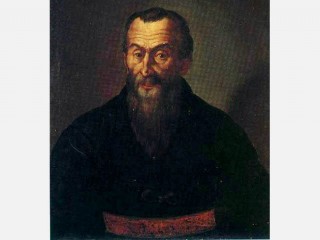
Adrian Willaert biography
Date of birth : -
Date of death : 1562-12-07
Birthplace : Bruges, France
Nationality : French
Category : Famous Figures
Last modified : 2010-11-12
Credited as : Composer, founded the Venetian school of composers,
Adrian Willaert (ca. 1480-1562), a Franco-Flemish composer active in Italy, founded the Venetian school of composers.
It is supposed that Adrian Willaert was born in Bruges, and almost nothing is known of his earliest years. He was intended for the law and went to Paris for legal training but soon switched to music, becoming a student of Jean Mouton, a disciple of Josquin des Prez. After completing his musical studies, Willaert sojourned briefly in Rome and then entered the service of Duke Alfonso d'Este I at Ferrara (1522-1525). For the following three years (1525-1527) he was employed by the duke's brother, Ippolito d'Este II, Archbishop of Milan. Finally, in 1527, Willaert was named choir director of St. Mark's in Venice, and he retained this important post for his last 35 years, training many illustrious composers who constitute the Venetian school.
Willaert's works include all the major forms of his time, such as Masses, motets, madrigals, villanescas, and chansons. Among the secular genres, first place must go to the madrigals. Willaert grafted northern polyphony onto the simple Italian form, raising it to the artistic level of the imitative motet; at the same time he continued to write uncomplicated native forms such as the villanesca. His French chansons may be divided into two groups: melismatic, canonic, cantus-firmus pieces from his early years; and syllabic, text-oriented, and occasionally chromatic pieces reflecting the influence of the Italian madrigal.
Much more significant are the sacred works, as befitted the choirmaster of the second most important church in Italy. Most of his ten surviving Masses are "parodies", that is, elaborations of preexistent motets, madrigals, or chansons. Despite their beauty, they rank below the approximately 350 motets in which he carried forward, and even went beyond, the brilliant models of Josquin des Prez. The Latin texts of Willaert's motets included such diverse sources as the Aeneid of Virgil, devotional lyrics of contemporary poets, and the liturgical books of the Roman Catholic Church. The music of these masterful creations is filled with canons, thoroughgoing imitation, mild chromaticism, and polychoral writing.
Willaert's polychoral psalms of 1550 popularized this already known style of composition and influenced later composers such as Andrea and Giovanni Gabrieli to the degree that Willaert was credited until recently with the invention of chori spezzati, or scoring for two antiphonal choirs. His experiments with chromaticism influenced such students as Nicolo' Vicentino; and another pupil, Gioseffo Zarlino, derived from his polyphonic achievements the most complete analysis of 16th-century counterpoint.
For an analysis of Willaert's style see Alfred Einstein, The Italian Madrigal (3 vols., trans. 1949), and Gustave Reese, Music in the Renaissance (1954; rev. ed. 1959). The role of Willaert's music in Renaissance society is treated in Paul Henry Lang, Music in Western Civilization (1941).
















